‘The beauty of Canada’: Senator Jaffer reflects on her 23-year Senate career
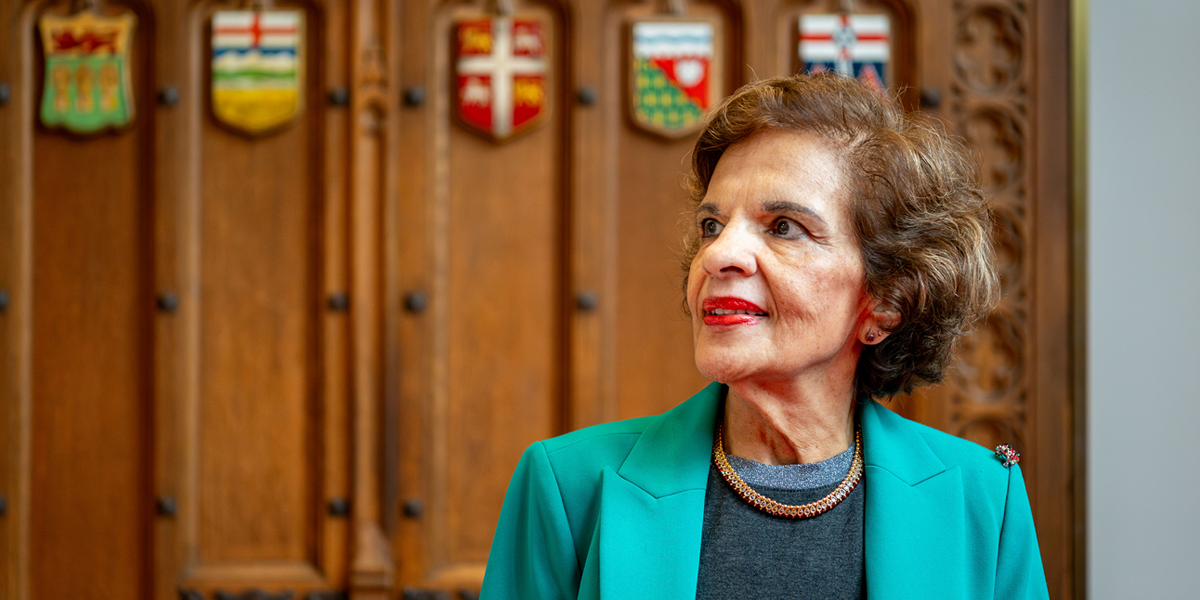
Senator Mobina S.B. Jaffer and her family came to Canada as refugees in 1975, after they were exiled from Uganda with the country’s South Asian population.
On the day they landed in Vancouver, her father said they had to start giving back to the country that welcomed them. Senator Jaffer kept that value at the heart of her illustrious career. She became the first South Asian woman to practise law in Canada and, in 2001, she was appointed as the first Muslim, African-born and South Asian senator. Many senators gave heartfelt speeches in honour of her accomplishments and contributions to the Senate during the June 12, 2024, sitting.
Ahead of her retirement on August 20, 2024, Senator Jaffer reflects on her journey from Uganda to Canada, her women’s rights advocacy and her 23-year Senate career.
You have said that you are proud to hold multiple identities as an Ismaili Muslim, an African, a South Asian and a Canadian. How has your background influenced your Senate work?
It has in every way I can think of. In the Ismaili Muslim faith, we have a credo of volunteerism and giving. My spiritual leader, the Aga Khan, has always guided us to reach out and support others. That’s my foundation.
As a Muslim and an Indian, I have also been able to address issues of racism or racial profiling post-9/11.
I am very proud of my African heritage. My father was a member of Parliament in Uganda, and we never thought we would have to leave, not in our wildest dreams. But we’ve gone back, and we are still connected to the country. In July, I had the pleasure of returning there with my five sisters, our children and our grandchildren, and staying at the hotel my father used to own.
People there are fascinated that a refugee would become a Canadian senator. That’s the beauty of Canada.
You have often spoken fondly about your parents’ influence on your life and career. What values have you learned from them?
My father comes from an Indian culture where girls are not treated equally, but he always treated my five sisters and me as equals.
I remember going to kindergarten in Uganda — this was before independence — and I was thrown out because I wasn’t white. My dad stood up for me. He said, “Don’t let anybody treat you as second class. It’s not about your skin. It’s about you.” It was my first lesson on equality.
 Senator Mobina S.B. Jaffer stands before an India booth at the Senate’s celebration of Asian Heritage Month in 2017. Born and raised in Uganda, she has Indian roots from her parents.
Senator Mobina S.B. Jaffer stands before an India booth at the Senate’s celebration of Asian Heritage Month in 2017. Born and raised in Uganda, she has Indian roots from her parents.
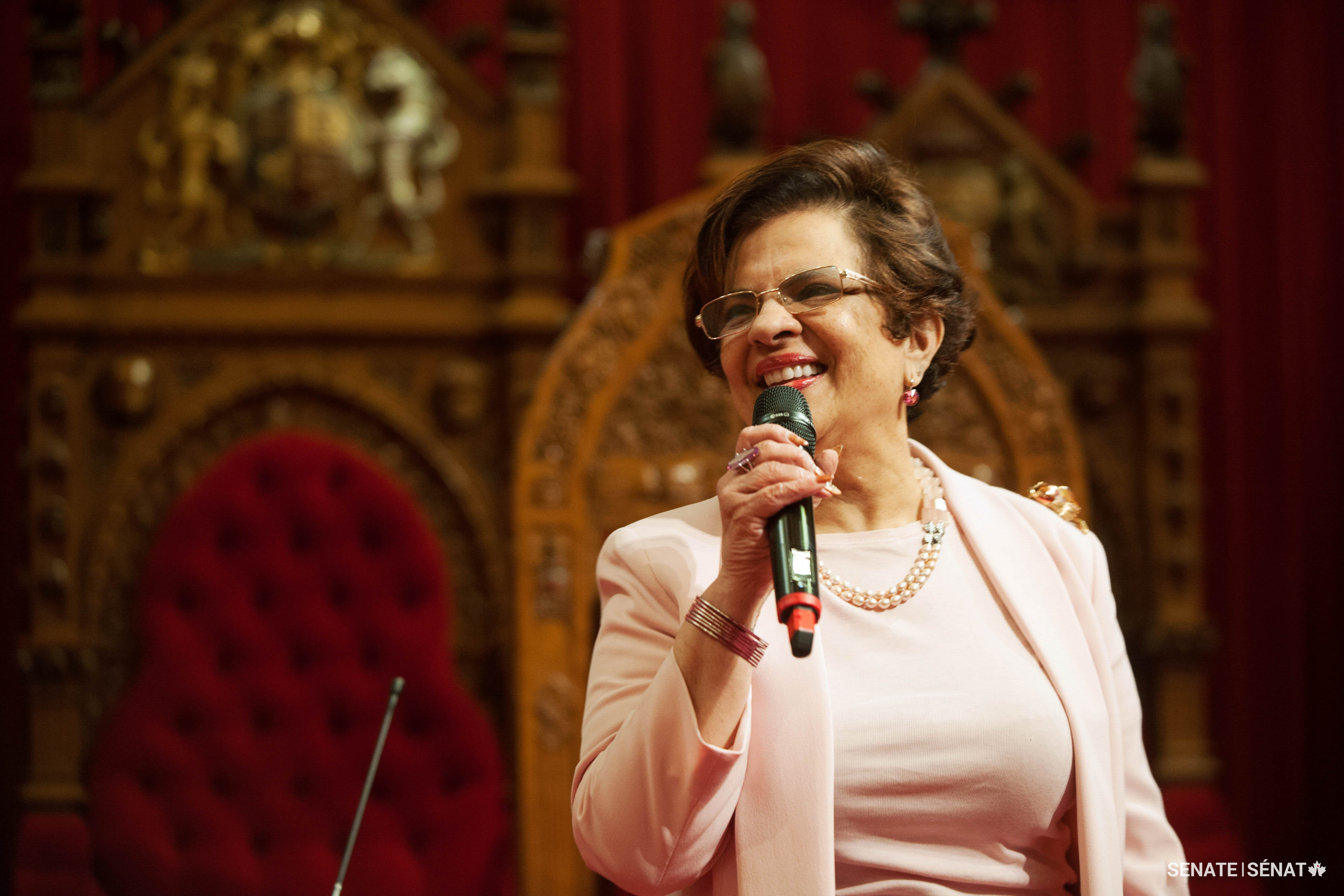 Senator Jaffer addresses elementary school students assembled in the original Senate Chamber in Centre Block for the International Day of Pink on April 12, 2017.
Senator Jaffer addresses elementary school students assembled in the original Senate Chamber in Centre Block for the International Day of Pink on April 12, 2017.
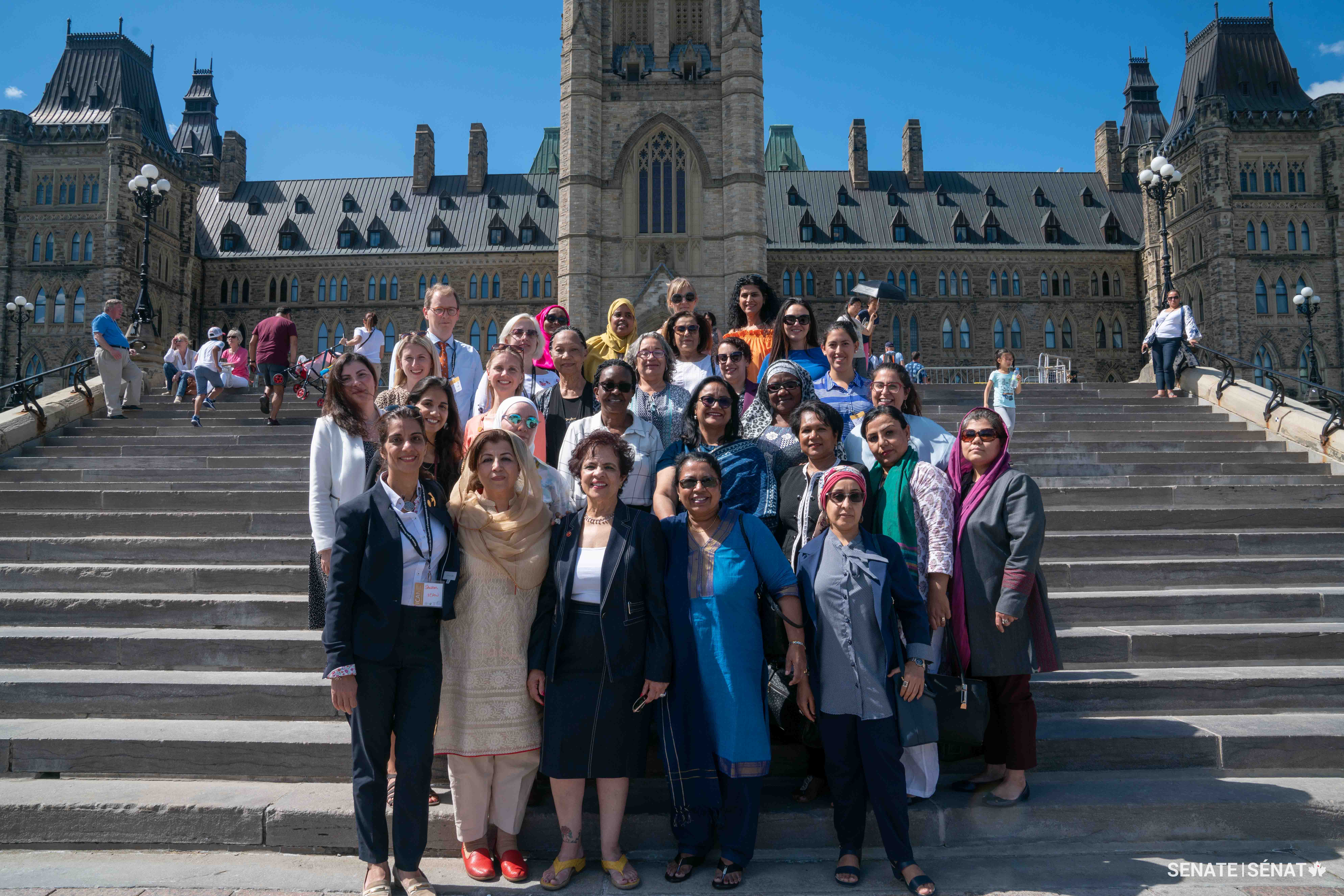 Senator Jaffer stands on the steps of Centre Block with a group of peacebuilders from around the world, including Afghanistan, Syria, Yemen, Myanmar, Colombia and South Sudan. They were visiting Ottawa in 2018 as part of an International Civil Society Action Network program.
Senator Jaffer stands on the steps of Centre Block with a group of peacebuilders from around the world, including Afghanistan, Syria, Yemen, Myanmar, Colombia and South Sudan. They were visiting Ottawa in 2018 as part of an International Civil Society Action Network program.
My father gave the girls in my family the best education possible. He sent me to England for boarding school and I later earned a law degree. My mother was a teacher and then a social worker. She gave me patience, persistence and softness.
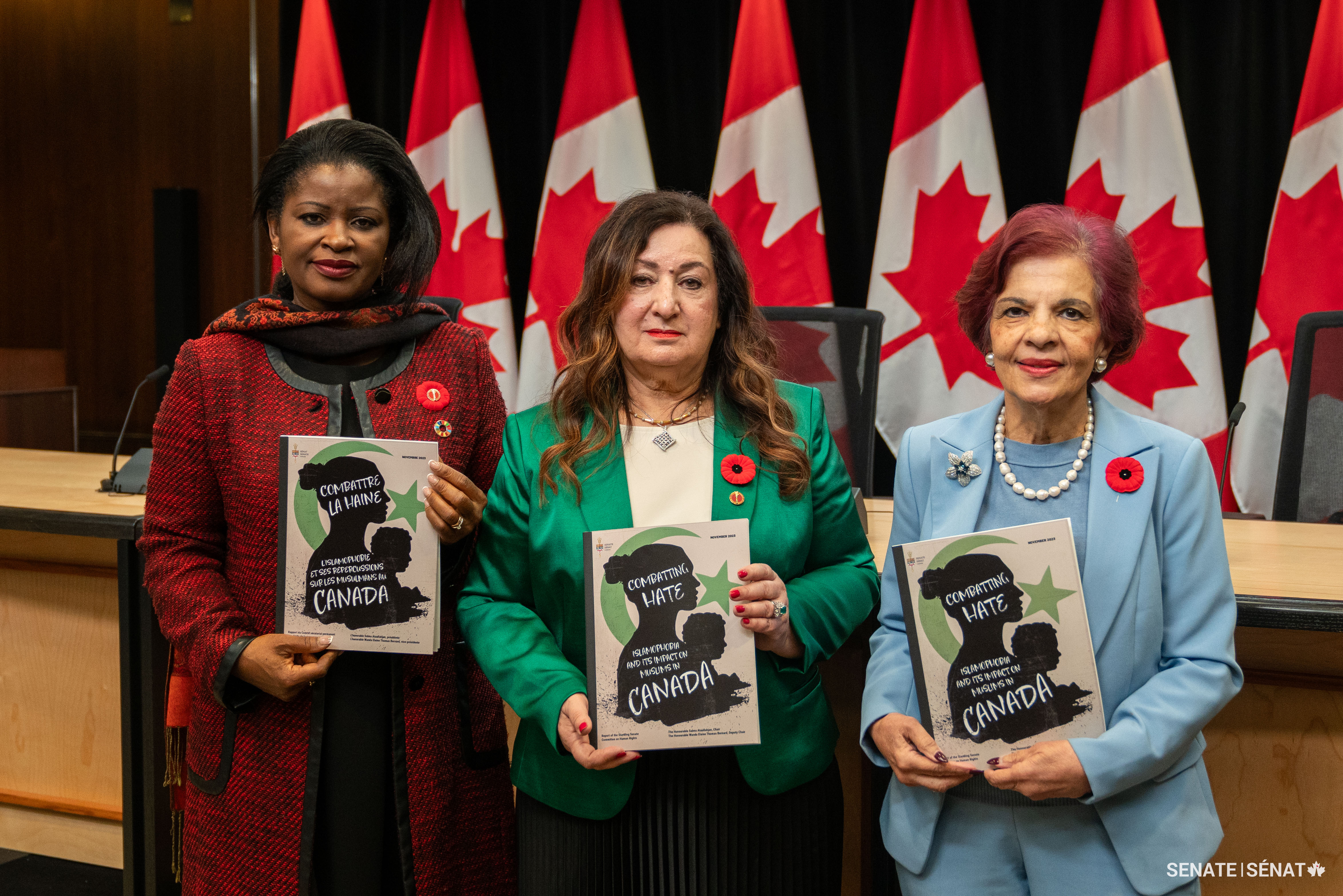 From left, senators Amina Gerba, Salma Ataullahjan and Mobina S.B. Jaffer hold copies of the Senate Committee on Human Rights’ report on Islamophobia in Canada in 2023.
From left, senators Amina Gerba, Salma Ataullahjan and Mobina S.B. Jaffer hold copies of the Senate Committee on Human Rights’ report on Islamophobia in Canada in 2023.
You were one of the first senators to start using social media and blogging, and you’ve been a champion for the Senate’s efforts to communicate its work to Canadians. Why has communication been so important to you?
When I came here, I resented the Senate’s image. I would go home and tell people how busy my day was, and they would smirk. The perception was that senators have a big lunch, drink and then sleep away the afternoon.
I felt that it was very important that people understood what the Senate was and what we did. Everywhere I went, I would go on local, community or diaspora television programs to talk about the work of the Senate, and I would encourage my fellow senators to do the same.
I truly believe that we are doing a much better job of communicating to the public. This is partly thanks to the Senate’s communications team, but senators are also much more aware of the importance of getting the message across. I find that the public is more open minded about the Senate today.
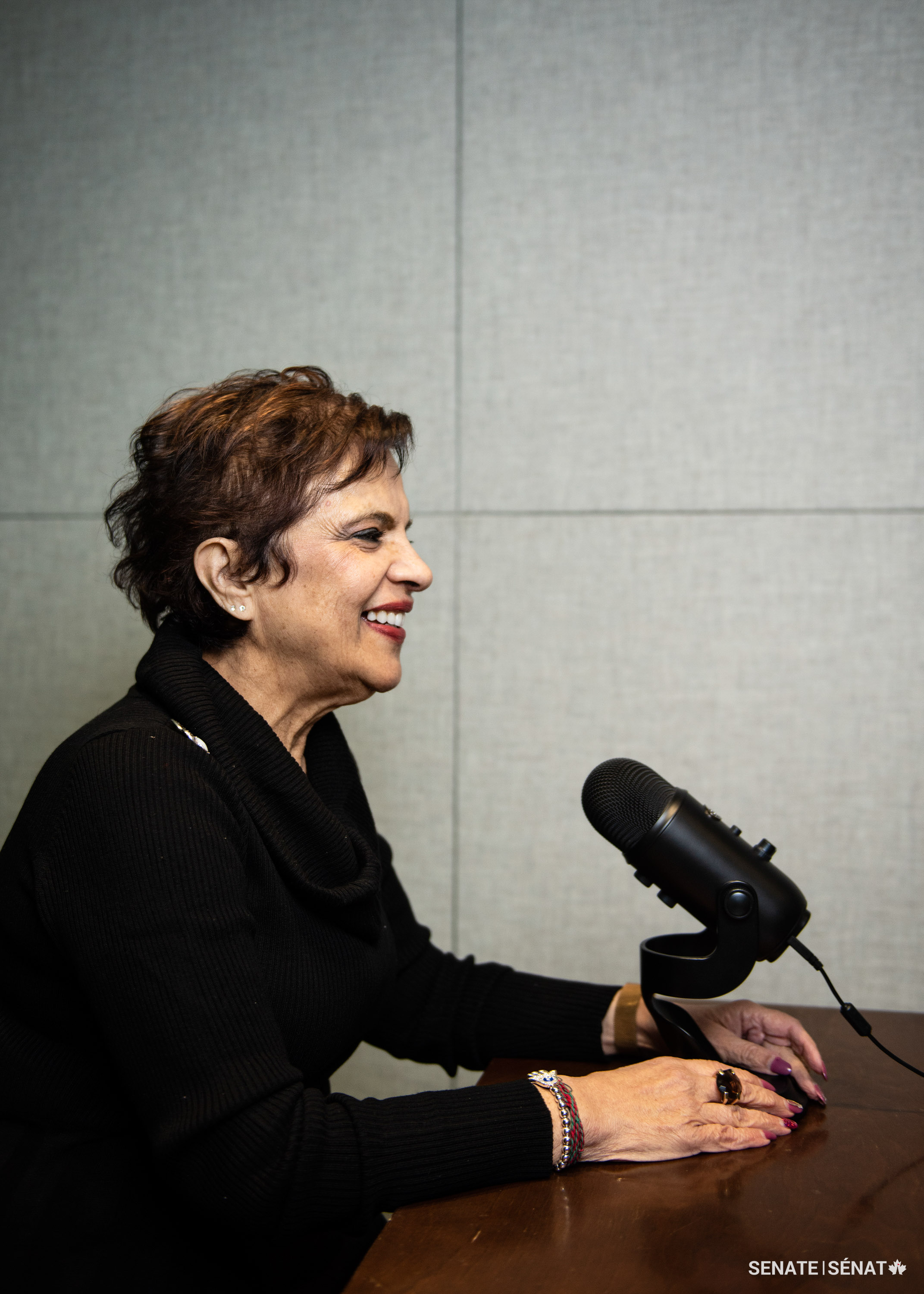 Podcasting is one of Senator Jaffer’s many means of communicating with the public about her work and the role of the Senate.
Podcasting is one of Senator Jaffer’s many means of communicating with the public about her work and the role of the Senate.
You were sworn in to the Red Chamber shortly after 9/11. How did this event affect how you approached your role as Canada’s first Muslim senator?
It was not a fun time to be welcomed into the Senate as the first Muslim senator. The hardest part for me was hearing people accusing all Muslims of being terrorists. I would have to remind them that they were talking about me.
Everyone was showing their prejudices and I had to be the gatekeeper. I brought people from the community to explain to senators that we are not all terrorists.
The airport was a nightmare at that time. When I would travel with other senators, they would pass through security without any problems, but I would be pulled aside and searched. There’s nothing more embarrassing than being checked in front of your peers. As a new senator, it hurt my confidence and my self-esteem to be treated like this.
I was part of the committee that studied terrorism in Canada where I challenged the authorities on racial profiling.
As a Liberal senator, I had a seat at the table of the weekly Liberal caucus meetings. I was able to speak about the realities of Muslims. I faced many challenges, but we are very blessed to have more Muslim voices in the Senate today.
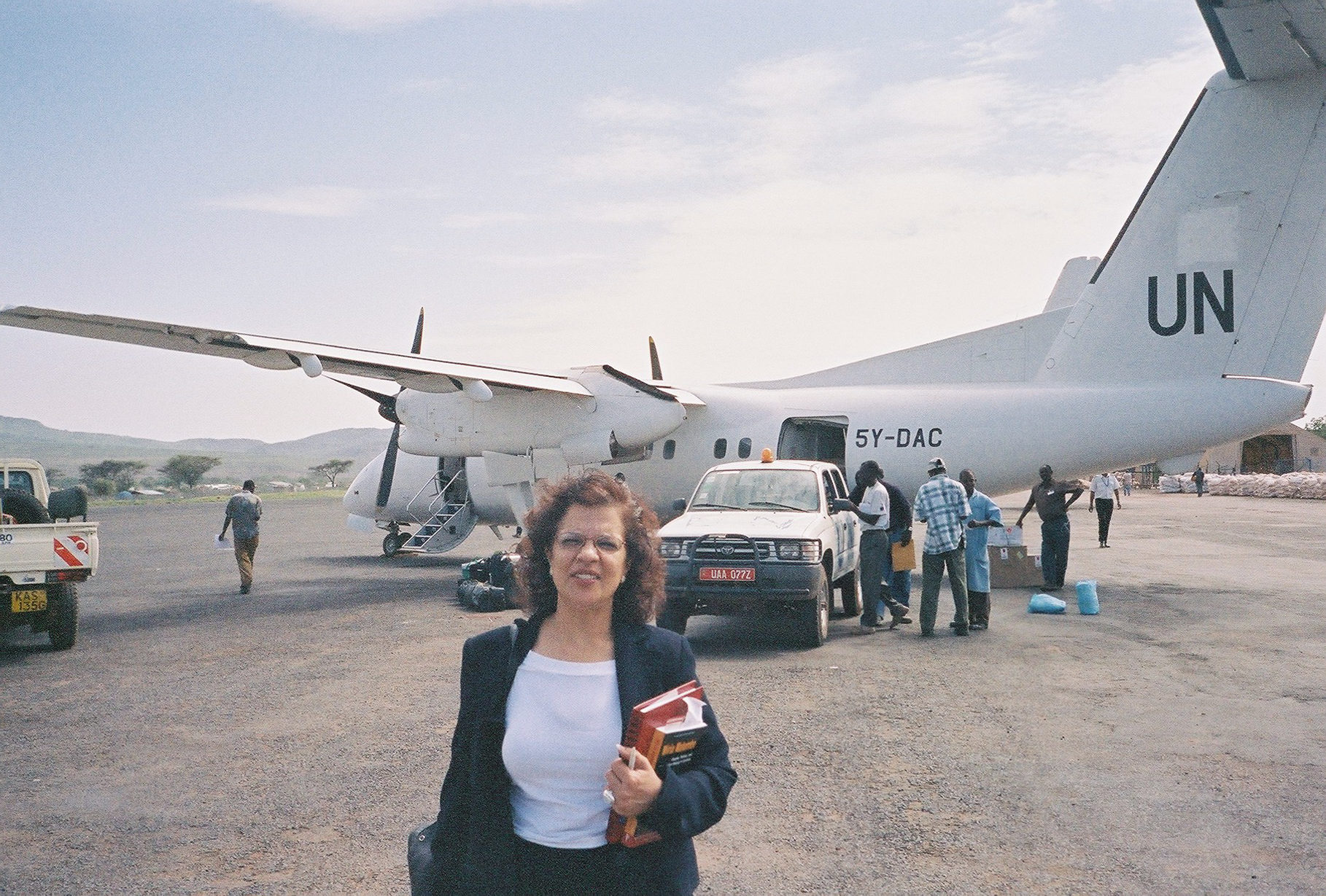 In 2002, Senator Jaffer was named the Special Envoy for Peace in Sudan, an initiative in collaboration with the United Nations within the region of Darfur. The senator said that her work fostering peace and stability in this tumultuous region was a highlight of her Senate career. (Photo credit: Office of Senator Mobina S.B. Jaffer)
In 2002, Senator Jaffer was named the Special Envoy for Peace in Sudan, an initiative in collaboration with the United Nations within the region of Darfur. The senator said that her work fostering peace and stability in this tumultuous region was a highlight of her Senate career. (Photo credit: Office of Senator Mobina S.B. Jaffer)
You have long advocated for women to play a more prominent role in global conflict resolution and peace talks. Tell us about some of your accomplishments.
In 2002, Prime Minister Jean Chrétien appointed me Canada’s Special Envoy for Peace in Sudan. That was the highlight of my career.
During the conflict in Darfur, women were not included in the peace talks. UN planes were being sent to pick up exiled men, but they were ignoring the women. I convinced Salim Salim, former president of Tanzania who was leading the peace negotiations, to send a plane for the women too. He agreed.
We brought 40 women to the table from different refugee camps. I found that the women had more knowledge of what was happening on the ground compared to the men who had been exiled for a long time.
I speak six languages, which is a strength. As special envoy, I was able to converse in Swahili and other languages with the ambassadors. As my father always said, you need just a few words to open the heart of the person you’re talking to.
I was also the chair of the Canadian Committee on Women, Peace and Security. It gave me the ability to empower other women.
You have chaired and served on several Senate committees, including the Senate Committee on Human Rights and the Senate Committee on Legal and Constitutional Affairs. What committee work are you most proud of?
I am proud of all my committee work because I give my best in everything that I do.
When I chaired the Senate Committee on Human Rights, we studied cyberbullying. We were the first committee to ever invite youth to testify.
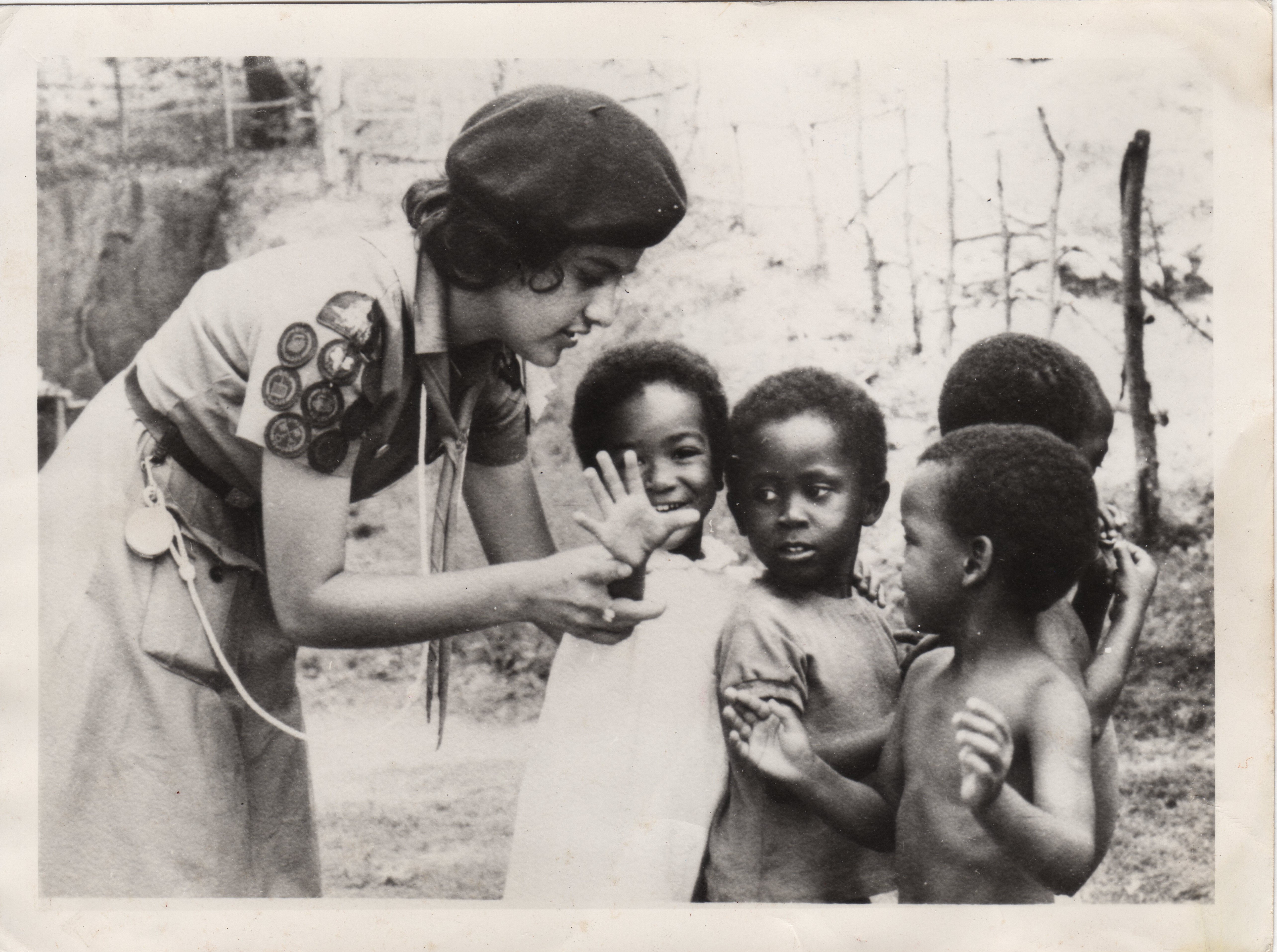 Senator Jaffer grew up as a girl guide in Uganda, becoming the second Queen’s Guide in East Africa during the 1960s. (Photo credit: Office of Senator Mobina S.B. Jaffer)
Senator Jaffer grew up as a girl guide in Uganda, becoming the second Queen’s Guide in East Africa during the 1960s. (Photo credit: Office of Senator Mobina S.B. Jaffer)
We put a lot of protocols in place to make sure they were protected throughout the process.
I was also proud to chair the Senate Committee on Legal and Constitutional Affairs because I’m a lawyer.
The work we did every day stood out to me. We worked on everything from animal rights to criminal issues. I found the work fascinating.
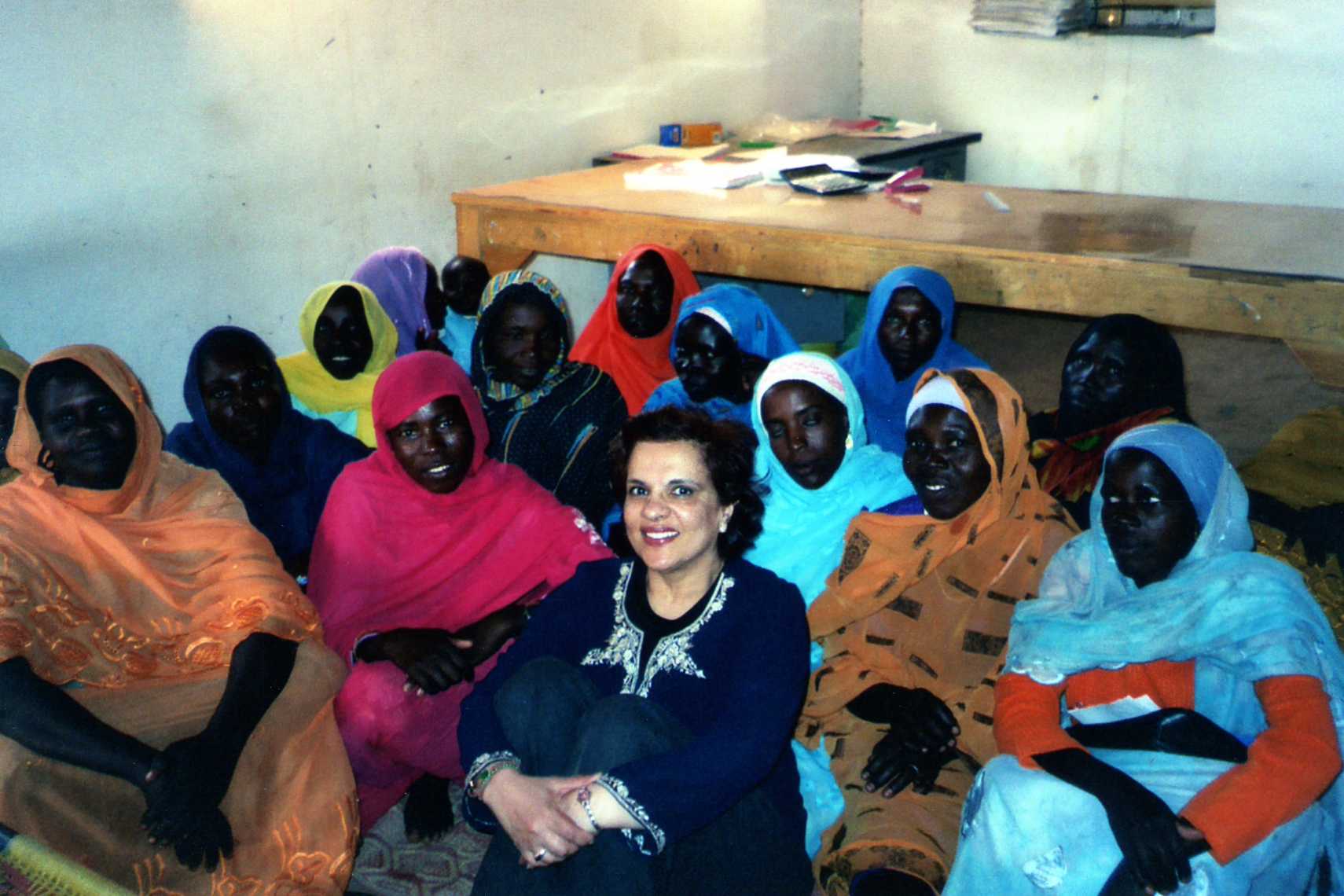 Senator Jaffer engaged in peace discussions with women’s groups in Darfur during her tenure as Canada’s Special Envoy for Peace in Sudan from 2002 to 2006. (Photo credit: Office of Senator Mobina S.B. Jaffer)
Senator Jaffer engaged in peace discussions with women’s groups in Darfur during her tenure as Canada’s Special Envoy for Peace in Sudan from 2002 to 2006. (Photo credit: Office of Senator Mobina S.B. Jaffer)
You have championed several bills through the Senate. Do any stand out to you?
I am proud of the International Mother Language Day Act, which designates February 21 as mother language day. It’s about respecting all languages and valuing the importance of communicating freely in the mother language of our choice.
In 2020, the Senate adopted my private bill, the Girl Guides of Canada Act. This was very special to me because I grew up in the Girl Guides. When I came to Canada, I started the Ismaili Girl Guides on the North Shore and then many other groups opened in our mosques.
I was very proud that the girls could go camping and do activities that they may not have otherwise done. Then I became the Girl Guides commissioner.
I’ve also been struggling to pass Bill S-235, which would achieve citizenship for children who come to Canada and have aged out of a government agency or foster care. It’s a real uphill battle but I’ve been trying.
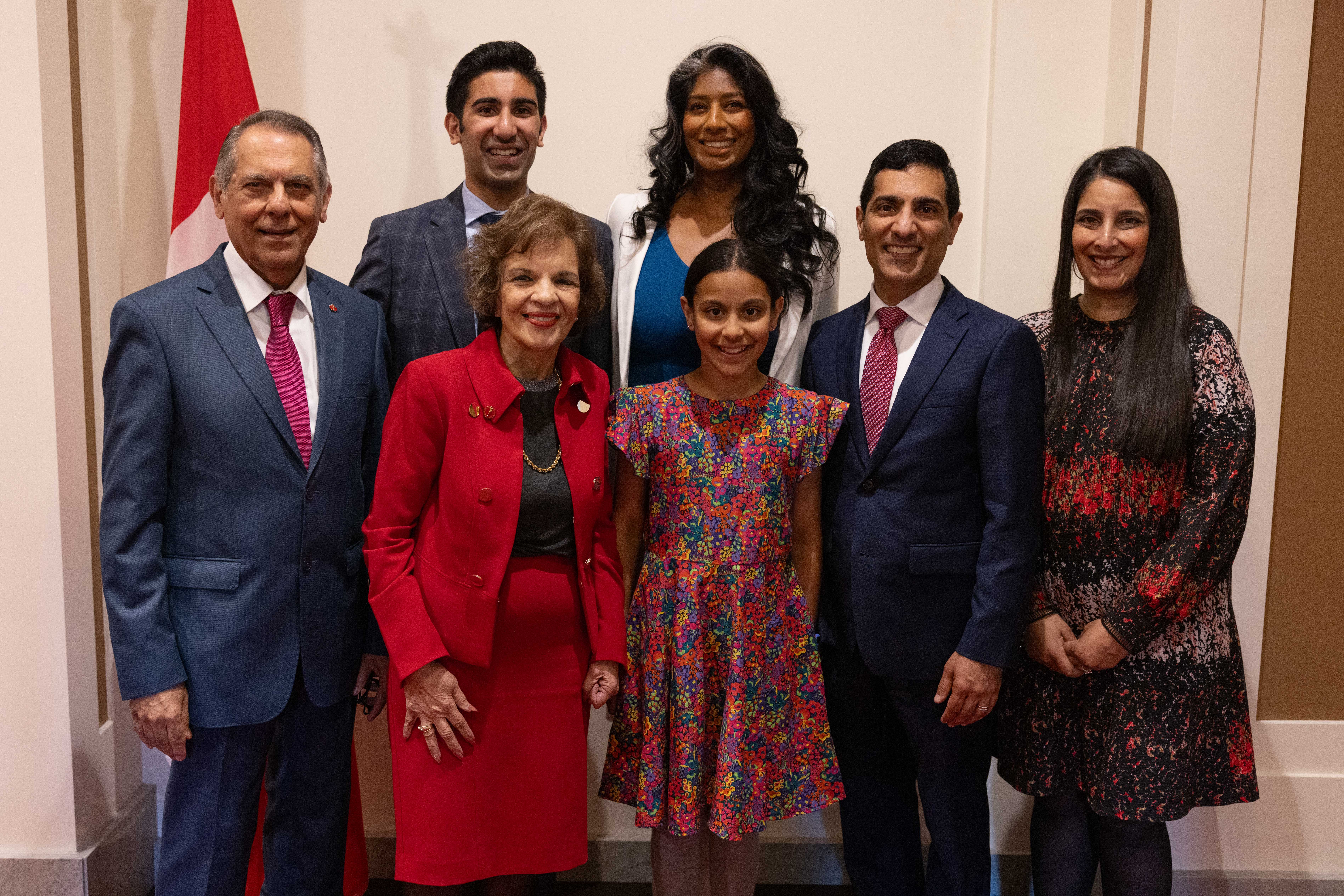 The Jaffer-Jeraj family in Ottawa for Senator Jaffer’s day of tributes in the Red Chamber on June 12, 2024. (Photo credit: Office of Senator Mobina S.B. Jaffer)
The Jaffer-Jeraj family in Ottawa for Senator Jaffer’s day of tributes in the Red Chamber on June 12, 2024. (Photo credit: Office of Senator Mobina S.B. Jaffer)
What’s next for you?
My son and I have a law practice in Vancouver, so I’ll return to that. My daughter and I run an egg farm, with about 100,000 chickens, which my sister and I inherited from my father. Unfortunately, we recently lost our chickens to the avian flu, so now we’re just starting to recover. We’ve suffered a big loss, but that’s the life of a farmer.
To me, the most important thing in life is my family. I’m grateful that I’ll be able to spend more time with them.
Learn more about Senator Mobina S.B. Jaffer in this article on SenCAplus.
Related articles
Tags
Committee news
‘The beauty of Canada’: Senator Jaffer reflects on her 23-year Senate career

Senator Mobina S.B. Jaffer and her family came to Canada as refugees in 1975, after they were exiled from Uganda with the country’s South Asian population.
On the day they landed in Vancouver, her father said they had to start giving back to the country that welcomed them. Senator Jaffer kept that value at the heart of her illustrious career. She became the first South Asian woman to practise law in Canada and, in 2001, she was appointed as the first Muslim, African-born and South Asian senator. Many senators gave heartfelt speeches in honour of her accomplishments and contributions to the Senate during the June 12, 2024, sitting.
Ahead of her retirement on August 20, 2024, Senator Jaffer reflects on her journey from Uganda to Canada, her women’s rights advocacy and her 23-year Senate career.
You have said that you are proud to hold multiple identities as an Ismaili Muslim, an African, a South Asian and a Canadian. How has your background influenced your Senate work?
It has in every way I can think of. In the Ismaili Muslim faith, we have a credo of volunteerism and giving. My spiritual leader, the Aga Khan, has always guided us to reach out and support others. That’s my foundation.
As a Muslim and an Indian, I have also been able to address issues of racism or racial profiling post-9/11.
I am very proud of my African heritage. My father was a member of Parliament in Uganda, and we never thought we would have to leave, not in our wildest dreams. But we’ve gone back, and we are still connected to the country. In July, I had the pleasure of returning there with my five sisters, our children and our grandchildren, and staying at the hotel my father used to own.
People there are fascinated that a refugee would become a Canadian senator. That’s the beauty of Canada.
You have often spoken fondly about your parents’ influence on your life and career. What values have you learned from them?
My father comes from an Indian culture where girls are not treated equally, but he always treated my five sisters and me as equals.
I remember going to kindergarten in Uganda — this was before independence — and I was thrown out because I wasn’t white. My dad stood up for me. He said, “Don’t let anybody treat you as second class. It’s not about your skin. It’s about you.” It was my first lesson on equality.
 Senator Mobina S.B. Jaffer stands before an India booth at the Senate’s celebration of Asian Heritage Month in 2017. Born and raised in Uganda, she has Indian roots from her parents.
Senator Mobina S.B. Jaffer stands before an India booth at the Senate’s celebration of Asian Heritage Month in 2017. Born and raised in Uganda, she has Indian roots from her parents.
 Senator Jaffer addresses elementary school students assembled in the original Senate Chamber in Centre Block for the International Day of Pink on April 12, 2017.
Senator Jaffer addresses elementary school students assembled in the original Senate Chamber in Centre Block for the International Day of Pink on April 12, 2017.
 Senator Jaffer stands on the steps of Centre Block with a group of peacebuilders from around the world, including Afghanistan, Syria, Yemen, Myanmar, Colombia and South Sudan. They were visiting Ottawa in 2018 as part of an International Civil Society Action Network program.
Senator Jaffer stands on the steps of Centre Block with a group of peacebuilders from around the world, including Afghanistan, Syria, Yemen, Myanmar, Colombia and South Sudan. They were visiting Ottawa in 2018 as part of an International Civil Society Action Network program.
My father gave the girls in my family the best education possible. He sent me to England for boarding school and I later earned a law degree. My mother was a teacher and then a social worker. She gave me patience, persistence and softness.
 From left, senators Amina Gerba, Salma Ataullahjan and Mobina S.B. Jaffer hold copies of the Senate Committee on Human Rights’ report on Islamophobia in Canada in 2023.
From left, senators Amina Gerba, Salma Ataullahjan and Mobina S.B. Jaffer hold copies of the Senate Committee on Human Rights’ report on Islamophobia in Canada in 2023.
You were one of the first senators to start using social media and blogging, and you’ve been a champion for the Senate’s efforts to communicate its work to Canadians. Why has communication been so important to you?
When I came here, I resented the Senate’s image. I would go home and tell people how busy my day was, and they would smirk. The perception was that senators have a big lunch, drink and then sleep away the afternoon.
I felt that it was very important that people understood what the Senate was and what we did. Everywhere I went, I would go on local, community or diaspora television programs to talk about the work of the Senate, and I would encourage my fellow senators to do the same.
I truly believe that we are doing a much better job of communicating to the public. This is partly thanks to the Senate’s communications team, but senators are also much more aware of the importance of getting the message across. I find that the public is more open minded about the Senate today.
 Podcasting is one of Senator Jaffer’s many means of communicating with the public about her work and the role of the Senate.
Podcasting is one of Senator Jaffer’s many means of communicating with the public about her work and the role of the Senate.
You were sworn in to the Red Chamber shortly after 9/11. How did this event affect how you approached your role as Canada’s first Muslim senator?
It was not a fun time to be welcomed into the Senate as the first Muslim senator. The hardest part for me was hearing people accusing all Muslims of being terrorists. I would have to remind them that they were talking about me.
Everyone was showing their prejudices and I had to be the gatekeeper. I brought people from the community to explain to senators that we are not all terrorists.
The airport was a nightmare at that time. When I would travel with other senators, they would pass through security without any problems, but I would be pulled aside and searched. There’s nothing more embarrassing than being checked in front of your peers. As a new senator, it hurt my confidence and my self-esteem to be treated like this.
I was part of the committee that studied terrorism in Canada where I challenged the authorities on racial profiling.
As a Liberal senator, I had a seat at the table of the weekly Liberal caucus meetings. I was able to speak about the realities of Muslims. I faced many challenges, but we are very blessed to have more Muslim voices in the Senate today.
 In 2002, Senator Jaffer was named the Special Envoy for Peace in Sudan, an initiative in collaboration with the United Nations within the region of Darfur. The senator said that her work fostering peace and stability in this tumultuous region was a highlight of her Senate career. (Photo credit: Office of Senator Mobina S.B. Jaffer)
In 2002, Senator Jaffer was named the Special Envoy for Peace in Sudan, an initiative in collaboration with the United Nations within the region of Darfur. The senator said that her work fostering peace and stability in this tumultuous region was a highlight of her Senate career. (Photo credit: Office of Senator Mobina S.B. Jaffer)
You have long advocated for women to play a more prominent role in global conflict resolution and peace talks. Tell us about some of your accomplishments.
In 2002, Prime Minister Jean Chrétien appointed me Canada’s Special Envoy for Peace in Sudan. That was the highlight of my career.
During the conflict in Darfur, women were not included in the peace talks. UN planes were being sent to pick up exiled men, but they were ignoring the women. I convinced Salim Salim, former president of Tanzania who was leading the peace negotiations, to send a plane for the women too. He agreed.
We brought 40 women to the table from different refugee camps. I found that the women had more knowledge of what was happening on the ground compared to the men who had been exiled for a long time.
I speak six languages, which is a strength. As special envoy, I was able to converse in Swahili and other languages with the ambassadors. As my father always said, you need just a few words to open the heart of the person you’re talking to.
I was also the chair of the Canadian Committee on Women, Peace and Security. It gave me the ability to empower other women.
You have chaired and served on several Senate committees, including the Senate Committee on Human Rights and the Senate Committee on Legal and Constitutional Affairs. What committee work are you most proud of?
I am proud of all my committee work because I give my best in everything that I do.
When I chaired the Senate Committee on Human Rights, we studied cyberbullying. We were the first committee to ever invite youth to testify.
 Senator Jaffer grew up as a girl guide in Uganda, becoming the second Queen’s Guide in East Africa during the 1960s. (Photo credit: Office of Senator Mobina S.B. Jaffer)
Senator Jaffer grew up as a girl guide in Uganda, becoming the second Queen’s Guide in East Africa during the 1960s. (Photo credit: Office of Senator Mobina S.B. Jaffer)
We put a lot of protocols in place to make sure they were protected throughout the process.
I was also proud to chair the Senate Committee on Legal and Constitutional Affairs because I’m a lawyer.
The work we did every day stood out to me. We worked on everything from animal rights to criminal issues. I found the work fascinating.
 Senator Jaffer engaged in peace discussions with women’s groups in Darfur during her tenure as Canada’s Special Envoy for Peace in Sudan from 2002 to 2006. (Photo credit: Office of Senator Mobina S.B. Jaffer)
Senator Jaffer engaged in peace discussions with women’s groups in Darfur during her tenure as Canada’s Special Envoy for Peace in Sudan from 2002 to 2006. (Photo credit: Office of Senator Mobina S.B. Jaffer)
You have championed several bills through the Senate. Do any stand out to you?
I am proud of the International Mother Language Day Act, which designates February 21 as mother language day. It’s about respecting all languages and valuing the importance of communicating freely in the mother language of our choice.
In 2020, the Senate adopted my private bill, the Girl Guides of Canada Act. This was very special to me because I grew up in the Girl Guides. When I came to Canada, I started the Ismaili Girl Guides on the North Shore and then many other groups opened in our mosques.
I was very proud that the girls could go camping and do activities that they may not have otherwise done. Then I became the Girl Guides commissioner.
I’ve also been struggling to pass Bill S-235, which would achieve citizenship for children who come to Canada and have aged out of a government agency or foster care. It’s a real uphill battle but I’ve been trying.
 The Jaffer-Jeraj family in Ottawa for Senator Jaffer’s day of tributes in the Red Chamber on June 12, 2024. (Photo credit: Office of Senator Mobina S.B. Jaffer)
The Jaffer-Jeraj family in Ottawa for Senator Jaffer’s day of tributes in the Red Chamber on June 12, 2024. (Photo credit: Office of Senator Mobina S.B. Jaffer)
What’s next for you?
My son and I have a law practice in Vancouver, so I’ll return to that. My daughter and I run an egg farm, with about 100,000 chickens, which my sister and I inherited from my father. Unfortunately, we recently lost our chickens to the avian flu, so now we’re just starting to recover. We’ve suffered a big loss, but that’s the life of a farmer.
To me, the most important thing in life is my family. I’m grateful that I’ll be able to spend more time with them.
Learn more about Senator Mobina S.B. Jaffer in this article on SenCAplus.


